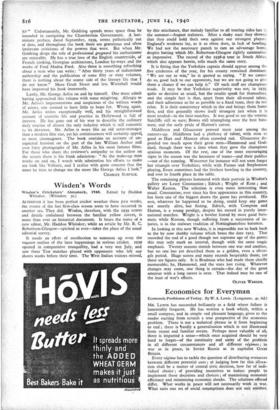Wisden's Words
Wisden's Cricketers' Almanack, 1940. Edited by Haddon Whitaker. (Whitaker. 5s.)
ALTHOUGH it has been perfect cricket weather these past weeks, the events of the last first-class season seem to have occurred in another era. They did. Wisden, therefore, with the 1939 scores and details embalmed between the familiar yellow covers, is more than ever an historical document. It bears the name of a new editor, Mr. Haddon Whitaker; while an article by Mr. R. C. Robertson-Glasgow—spirited as ever—takes the place of the usual editorial survey.
It needs an effort of recollection to summon up even the vaguest outline of the later happenings in serious cricket. 1939 opened in comparative tranquillity, had a very wet July, and saw three Test matches played with opponents who left our shores weeks before their time. The West Indian visitors missed,
by this mischance, that malady familiar to all touring sides late the summer—August staleness. After a shaky start they showed that they could hold their own against our strongest players. England's weakness lay, as it so often does, in lack of bowling. We had not the necessary punch to ram an advantage home, despite batting which Mr. Robertson-Glasgow rightly summarises as impressive. The record of the 1938-9 tour in South Africa, which also appears herein, tells much the same story.
It is fitting that the Yorkshire captain should appear among the five cricketers of the year, for his county remained dominant. " We are out to win," he is quoted as saying. " If we cannot do so, good luck to our opponents, but we are not going to give them a chance if we can help it." Of such stuff are champion't made. It may be that Yorkshire superiority was not, in 1939, quite so decisive as usual, but the results speak for themselves, and the simple fact is that, apart from their all-round talent, and their adherence so far as possible to a fixed team, they do not relax. It is their consistency which in the end brings them home first, and this generally shows itself strongest just when it is most needed—in the later matches. It was good to see the veteran Sutcliffe still so sure; Bowes still triumphing over the best bats- men; and the early pride of Hutton's career.
Middlesex and Gloucester pressed most near among the runners-up. Middlesex had a plethora of talent, with men so good as Hart and Muncer often crowded out. Gloucester de- pended too much upon their great men—Hammond and God- dard, though there was a time when they gave the champions anxious moments. Of the rest, one of the most encouraging signs in the season was the keenness of teams—and their publics —out of the running. Worcester for instance will not soon forget her triumph over Yorkshire; while with Fames and Stephenson playing, Essex sometimes had the liveliest bowling in the country, and rose to fourth place in the table.
The remaining players honoured with their portrait in Wisden's gallery are Leary Constantine ; Edrich ; Wright of Kent ; and Walter Keeton. The selection is even more interesting than usual. Constantine, ever since his first appearance in this country, has been one of the biggest draws the game has produced. His zest, whatever he happened to be doing, could keep any game not merely alive, but fizzing. Edrich, with Compton and Hutton, is a young prodigy, despite his record in purely inter- national matches. Wright is a bowler feared by most good bats- men; while Keeton, though suffering from a succession of in- juries, is in the stalwart tradition of Nottinghamshire batsmen.
In looking at this new Wisden, it is impossible not to hark back to the by now shabby volume which bears the date 1915. That recorded the end of a good though not supreme age of the game; this may only mark an interval, though with the same tragic emphasis. Twenty seasons stretch between one war and another, but no one has yet described them as a golden, even a silver- gilt period. Huge scores and many records besprinkle them; yet these are figures only. It is Bradman who had made them chiefly memorable; he, Hammond, and the stars just rising. Whatever changes may come, one thing is certain—the day of the great amateur with a long career is over. That indeed may be one of the least of war's effects.
OLIVER WARNER.






























 Previous page
Previous page